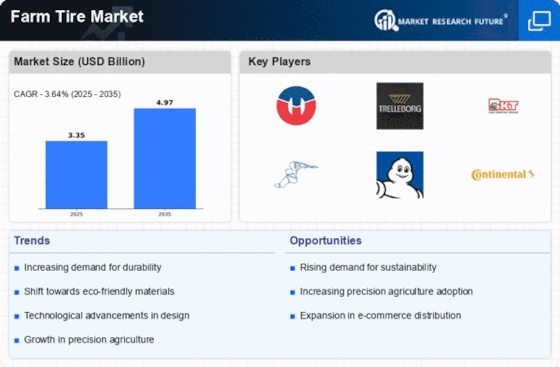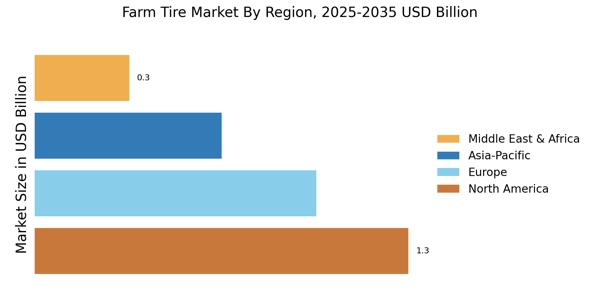Increased Crop Production Needs
The growing global population and the subsequent demand for food have led to an increase in crop production needs, which significantly impacts the Farm Tire Market. Farmers are under pressure to enhance productivity and yield, prompting them to invest in high-performance machinery equipped with specialized tires. Reports indicate that agricultural output is expected to rise by 20% over the next decade, necessitating the use of advanced tire technology to support this growth. Tires designed for specific crops and terrains are becoming increasingly essential, as they can improve efficiency and reduce soil compaction. This heightened focus on productivity is likely to drive innovation and expansion within the Farm Tire Market.
Rising Agricultural Mechanization
The increasing trend of agricultural mechanization appears to be a primary driver for the Farm Tire Market. As farmers adopt advanced machinery for planting, harvesting, and other agricultural tasks, the demand for specialized tires that can withstand the rigors of heavy equipment usage rises. In recent years, the number of tractors and other farming equipment has surged, leading to a corresponding increase in tire sales. For instance, data indicates that the number of tractors in operation has grown by approximately 5% annually, which directly correlates with the need for durable and efficient farm tires. This trend suggests that as mechanization continues to evolve, the Farm Tire Market will likely experience sustained growth.
Expansion of Precision Agriculture
The expansion of precision agriculture is emerging as a significant driver for the Farm Tire Market. This farming approach utilizes technology to monitor and manage field variability in crops, which necessitates specialized equipment and tires. As precision agriculture gains traction, the demand for tires that can support high-tech machinery, such as GPS-guided tractors and drones, is expected to increase. Data suggests that the precision agriculture market is projected to grow at a compound annual growth rate of over 12% in the next five years. This growth indicates a corresponding rise in the need for tires that can handle the unique demands of precision farming, thereby propelling the Farm Tire Market forward.
Technological Innovations in Tire Design
Technological innovations in tire design are transforming the Farm Tire Market. Manufacturers are increasingly investing in research and development to create tires that offer enhanced performance, durability, and efficiency. Innovations such as improved tread patterns, advanced rubber compounds, and smart tire technology are becoming more prevalent. For example, tires equipped with sensors that monitor pressure and temperature can help prevent failures and extend tire life. The introduction of these advanced products is expected to attract more customers, as farmers seek to optimize their operations. As a result, the Farm Tire Market is likely to witness a shift towards high-tech solutions that cater to the evolving needs of modern agriculture.
Sustainability and Environmental Regulations
Sustainability and environmental regulations are increasingly influencing the Farm Tire Market. As governments and organizations push for more sustainable agricultural practices, the demand for eco-friendly tires is on the rise. Manufacturers are responding by developing tires made from renewable materials and those that minimize environmental impact. Additionally, regulations aimed at reducing carbon footprints are prompting farmers to seek tires that enhance fuel efficiency and reduce emissions. This shift towards sustainability not only aligns with The Farm Tire Industry. The emphasis on sustainable practices is likely to shape product offerings and consumer preferences in the coming years.

















